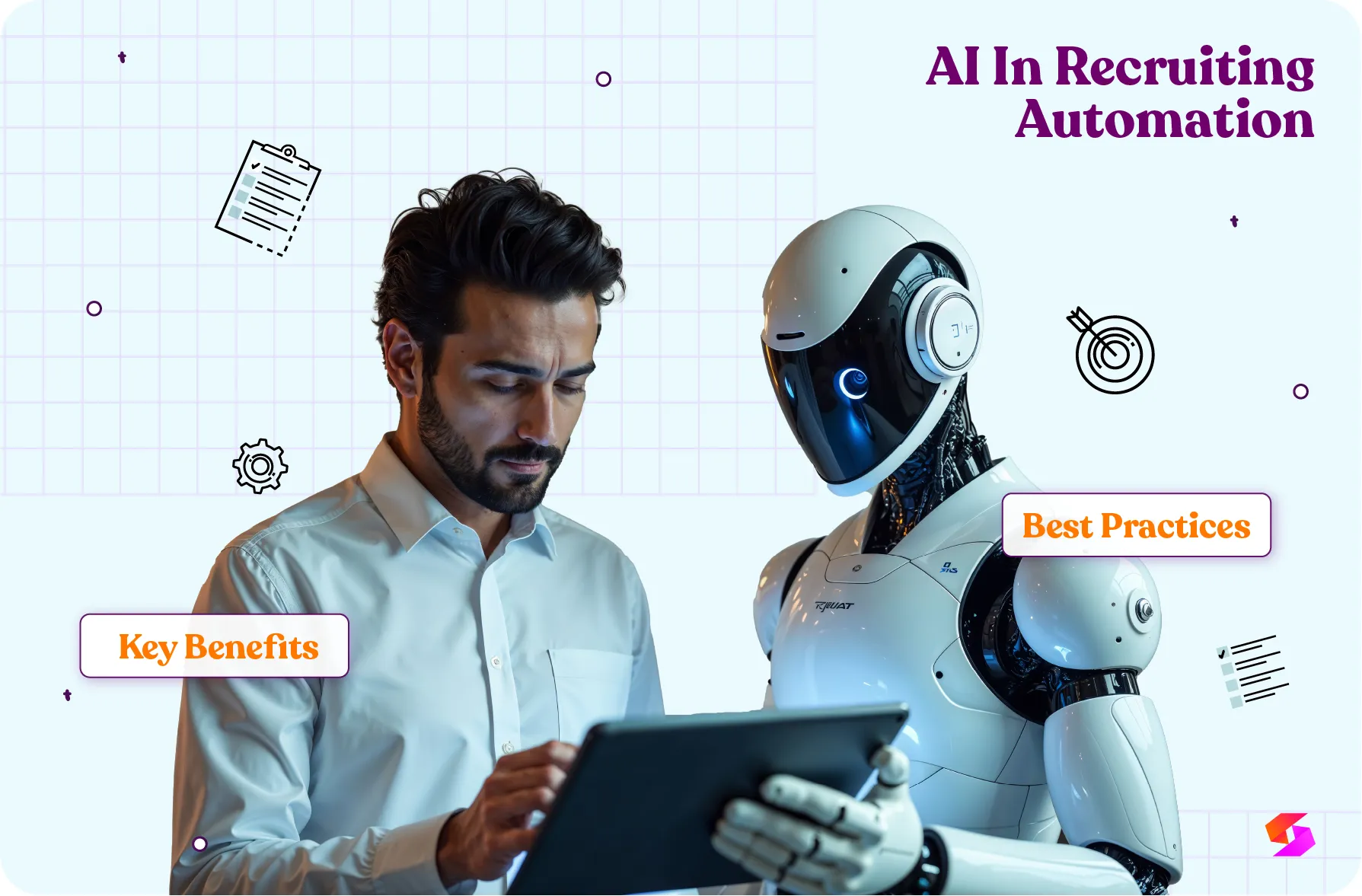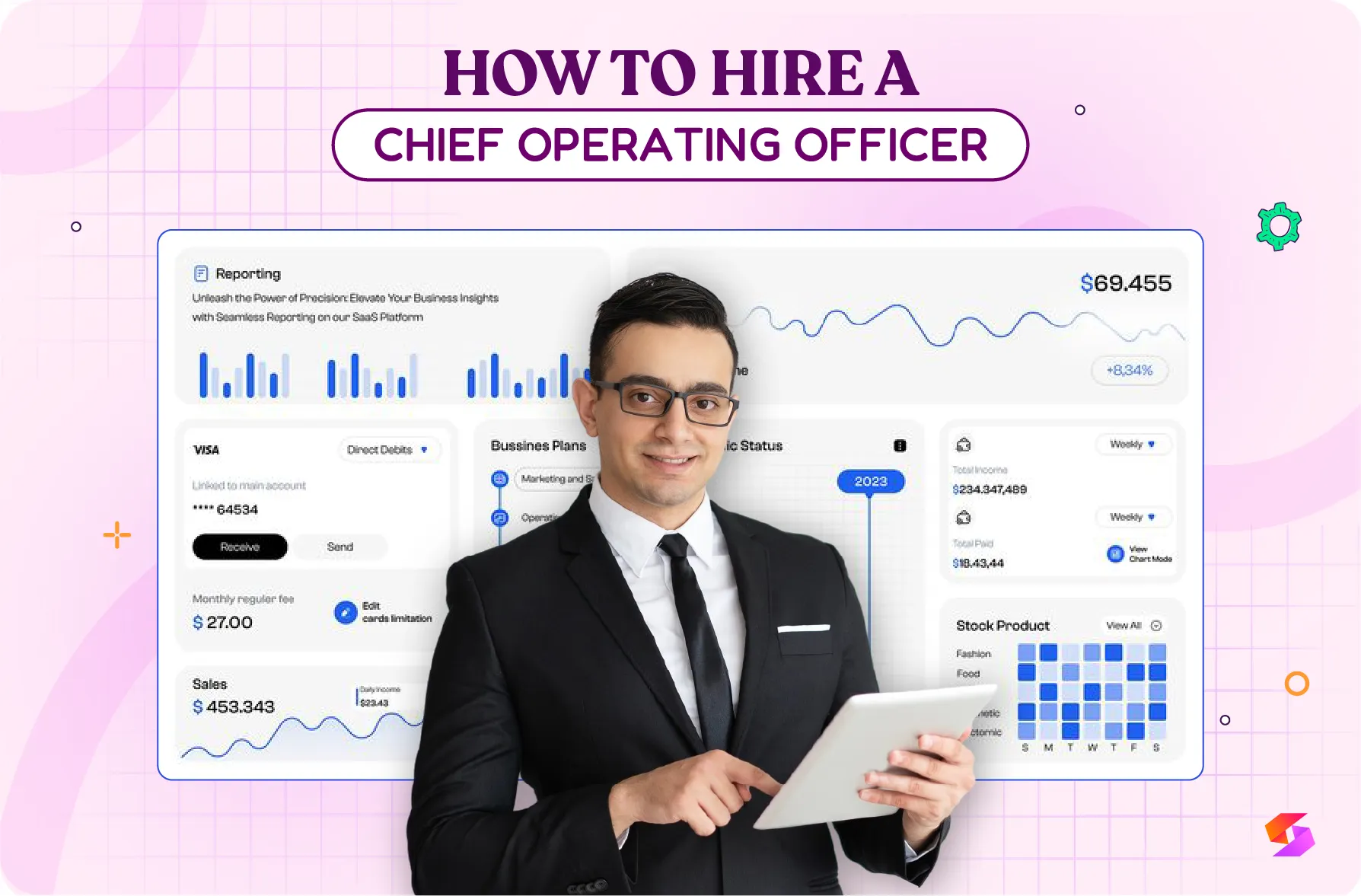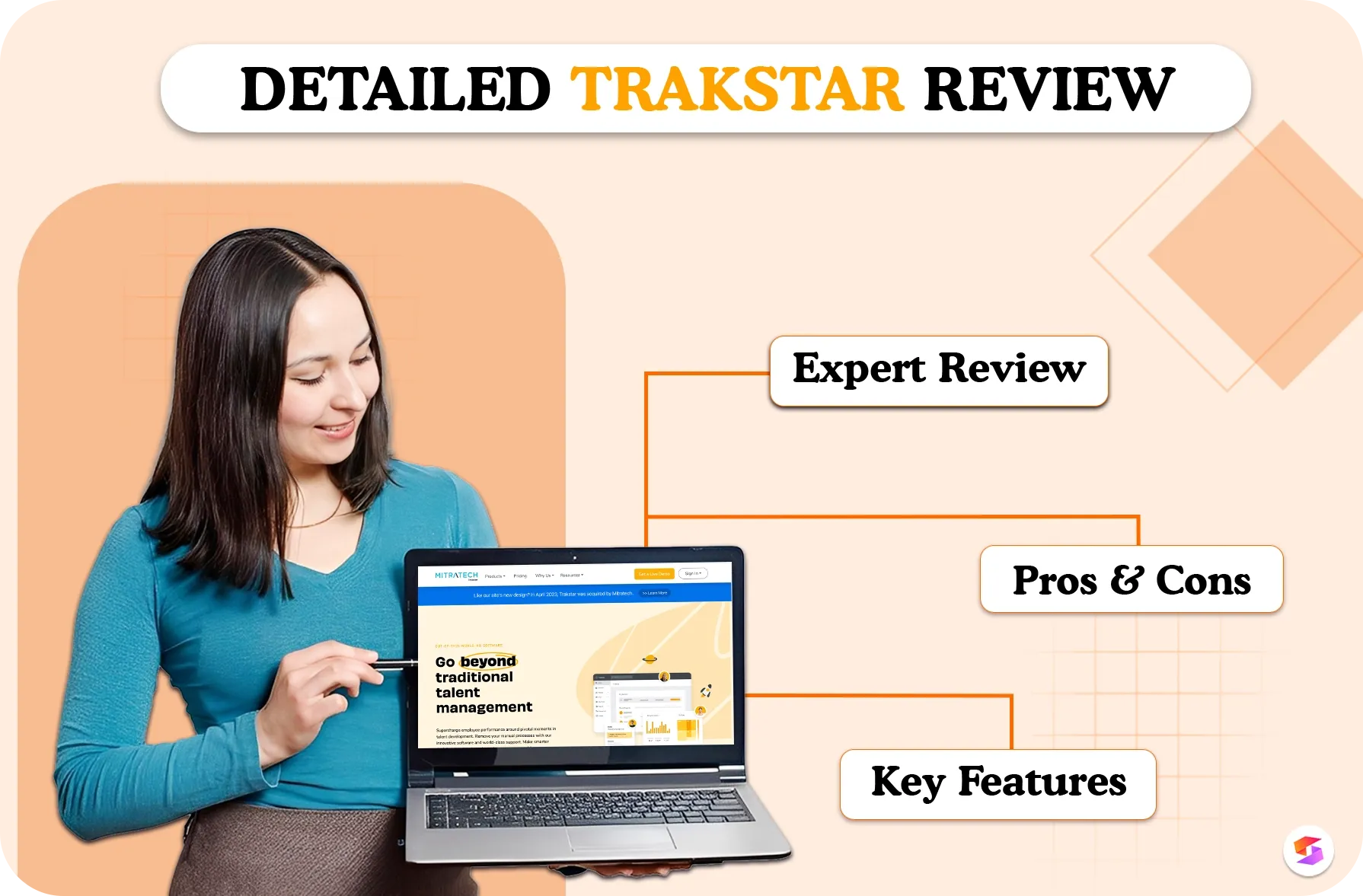About 77% of companies now use AI in hiring, whether it’s sorting resumes, screening candidates, or scheduling interviews. These tools cut down repetitive tasks and free recruiters to focus on finding the right fit.
As AI technology improves, it’s only going to play a bigger role in recruitment. In this research-backed guide, you will learn AI in recruitment, including everything from tools, benefits to best practices.
What is AI in Recruiting Automation?
AI in recruiting automation is simply the use of technology to help make the hiring process faster, smarter, and more efficient. Instead of spending hours manually sorting resumes or scheduling interviews, AI in recruitment tools can handle those tasks automatically.
These systems use artificial intelligence to analyze resumes, screen candidates, and even respond to job inquiries, all without human involvement. For example, in AI recruitment, a computer program can scan hundreds or even thousands of resumes in just a few minutes.
5 Best AI Recruiting Automation Tools
AI tools enhance the efficiency of recruitment teams, minimize bias, and allow companies to make more data-driven decisions. Here are five popular AI recruiting tools and platforms that are reshaping how businesses approach talent acquisition.
1. Skima AI
Skima AI is an AI recruitment automation tool built for end-to-end hiring. It offers a secure AI dashboard to streamline job posting, resume parsing, candidate rediscovery, explainable AI matching scores, outreach automation, and more.
You can also integrate it seamlessly with your ATS, HR, and VMS systems. Explore the platform today with a 14-day free trial. No credit card is needed.
Key Features:
- Skima AI helps you source and match candidates automatically.
- It analyzes resumes, job descriptions, and social profiles for context, not just keywords.
- Skima AI ranks candidates based on skills and experience.
- It saves you hours of manual screening by surfacing top talent quickly.
- Skima AI integrates seamlessly with your ATS.
- It provides predictive insights to improve your hiring quality.
2. HireVue
HireVue is an AI-powered video interviewing platform that helps companies streamline the interview process. Its technology uses AI to analyze candidate responses to pre-recorded questions, assessing traits like confidence, communication skills, and problem-solving abilities.
Its AI-enhanced capabilities help recruiters focus on high-value interactions while automating time-consuming tasks, such as initial interview screening.
Key Features:
- HireVue helps you screen candidates through video interviews.
- It analyzes tone, word choice, and body language for soft skills.
- HireVue offers both live and on-demand interview formats.
- It improves predictions by learning from past hiring decisions.
- HireVue saves time by automating first-round screening.
- It helps you focus on meaningful interactions with top candidates.
3. Pymetrics
Pymetrics is an AI-driven platform that uses neuroscience-based games to assess candidates' cognitive abilities and emotional traits. These games help create a detailed profile of a candidate’s soft skills, such as attention to detail, problem-solving, and resilience.
Unlike traditional assessment methods, Pymetrics allows candidates to demonstrate their potential in a more engaging and dynamic manner. This ensures that recruiters get a better understanding of their innate abilities, beyond what’s written on a resume.
Key Features:
- Pymetrics helps you measure cognitive and emotional strengths.
- It creates detailed profiles of skills like resilience and problem-solving.
- Pymetrics removes bias by eliminating demographic details.
- It engages candidates with fun, game-like assessments.
- Pymetrics promotes diversity by focusing on abilities, not backgrounds.
- It helps recruiters find hidden talent often overlooked in resumes.
4. Eightfold AI
Eightfold AI is an AI-based talent intelligence platform designed to help companies find, hire, and retain the best candidates. Its AI technology analyzes resumes, internal employee data, and social profiles to create a comprehensive candidate pool.
One of its key features is the platform's ability to continuously learn and improve its predictions based on historical hiring data. As more hiring decisions are made, Eightfold.ai refines its algorithms to help recruiters make smarter, more informed choices.
Key Features:
- Eightfold AI helps you expand your talent pool by analyzing resumes and social data.
- It improves accuracy by learning from past hiring outcomes.
- Eightfold AI integrates easily with ATS and HR systems.
- It provides analytics to track your recruitment pipeline.
- Eightfold AI predicts long-term success and retention.
- It helps you support internal mobility by matching employees to new roles.
5. XOR
XOR is an AI-driven chatbot designed to streamline candidate communication throughout the hiring process. This platform automates candidate engagement through text, voice, and social media messaging, allowing companies to quickly reach and interact with job seekers.
XOR seamlessly integrates with existing HR software, allowing easy adoption without system overhauls. Its natural language processing (NLP) capabilities enable meaningful, personalized conversations with candidates. This ensures a smooth, automated candidate experience.
Key Features:
- XOR helps you automate candidate conversations through chat, text, and voice.
- It answers questions and schedules interviews instantly.
- XOR integrates seamlessly with HR software.
- It uses NLP to keep conversations personal and natural.
- XOR improves candidate experience with quick, consistent communication.
- It frees recruiters to focus on final interviews and offers.
As AI grows, these tools will become even more important in how companies hire and find the right talent.
7 Key Benefits of AI in Recruitment Automation
Now that we understand the role of AI in recruitment automation, let's take a closer look at the 7 key benefits it brings to the hiring process, from faster sourcing to reduced bias.
1. Faster Candidate Sourcing
With AI recruiting, companies can quickly find candidates that match their job requirements. AI-powered tools scan resumes, job boards, and social media platforms to identify the most relevant candidates in no time.
This dramatically speeds up the hiring process, cutting down on the time recruiters spend manually sourcing candidates.
2. Reduced Human Bias
One of the main advantages of artificial intelligence and recruitment is its ability to reduce human bias. By focusing solely on data and qualifications, AI tools help ensure that candidates are evaluated fairly, regardless of their gender, age, race, or background. This helps create a more diverse and inclusive workplace.
3. Improved Candidate Experience
AI for hiring provides candidates with a smoother and faster experience. Automated responses, easy scheduling, and quick updates make the process more transparent.
Candidates are more likely to feel valued when their interactions with a company are quick and efficient.
4. Better Candidate Matching
AI recruitment tools match resumes and applications against job descriptions to ensure the best fit. These tools use advanced algorithms to go beyond keyword matching and find deeper connections between a candidate’s experience and the job. This leads to better quality hires.
5. Enhanced Efficiency in Screening and Interviews
By automating candidate screening, AI in recruiting saves HR teams a lot of time. AI systems can filter through large volumes of applications, assess their qualifications, and even conduct initial interviews through chatbots.
This frees up recruiters to focus on high-priority tasks like interviewing top candidates.
6. Streamlined Recruitment Process Automation
Recruitment process automation (RPA) with AI ensures that all stages of the hiring process, from initial contact to final hiring, are streamlined.
By automating repetitive tasks like interview scheduling or feedback gathering, AI helps HR departments run more smoothly and focus on finding the best candidates.
7. Data-Driven Decisions
AI-driven analytics provide valuable insights into the AI in the hiring process, helping companies make data-backed decisions.
By analyzing hiring patterns, AI tools can recommend the best strategies for sourcing and engaging candidates. This leads to smarter, more effective hiring strategies. Insights can also reveal common skill gaps, and share best free online courses to strengthen your pipeline
6 Limitations of AI in Recruiting Automation
While AI for recruiting brings many benefits, it's not without its challenges. Even though artificial intelligence and recruitment can make the hiring process faster and more efficient, there are some important limitations that companies need to keep in mind.
1. Bias in AI Algorithms
One of the biggest concerns with AI hiring is the risk of bias. If the AI is trained on biased data, it can unintentionally favor certain groups of candidates over others.
For example, if an AI system is trained on resumes from past hires who were mostly men, it might show a preference for male candidates, even though it's not intentional.
2. Lack of Human Touch
AI and recruitment can handle a lot of tasks, but it can’t replace the personal touch that human recruiters bring to the table. For example, understanding a candidate's personality, passion, and potential for growth often requires human judgment.
AI recruitment tools might help screen resumes and shortlist candidates, but they can’t truly evaluate things like a candidate's enthusiasm or fit for a company culture.
3. Limited Data and Context
AI works best when there is enough data to analyze, but AI for recruiting can struggle when the data is limited or incomplete.
For example, AI systems might not be able to fully understand the nuances of a candidate's background or experience if the resume doesn’t provide enough context.
4. Over-Reliance on Technology
While AI in recruiting can make processes faster and more efficient, over-relying on it can lead to issues. If a company depends too much on AI for recruiting, it might miss out on great candidates who don’t fit the exact criteria the system is programmed to search for.
Human input is still essential to ensure that artificial intelligence for recruiting doesn’t overlook talented people who might not perfectly fit into the data-driven boxes that AI uses.
5. Data Privacy Concerns
With artificial intelligence recruiting, there is a lot of personal data being shared and analyzed. This raises concerns about data privacy and security. Implementing otp verification can help ensure that only authorized users access sensitive recruitment data during the hiring process.
If not properly handled, candidates’ personal details, like contact information, resumes, and social media profiles, could be at risk. Companies using AI and recruitment tools must ensure they comply with privacy laws, such as GDPR, to protect candidate data.
6. High Implementation Costs
Adopting AI recruiting tools can require significant upfront investment in software, integration, and training. Smaller companies or those with limited budgets may struggle to afford these technologies or maximize their potential.
Additionally, ongoing costs for maintenance, updates, and support can add up over time. This means organizations must carefully evaluate the ROI before adopting AI recruiting solutions.
AI recruiting has great potential, but it’s not perfect. Companies must recognize its limits and use it responsibly, ethically, and alongside human judgment.
How AI is Changing Recruitment Practices?
Hiring has shifted from a slow, manual process to a data-driven strategy where AI helps uncover talent, predict success, and shape stronger teams.
- Faster and Smarter Screening: With AI talent acquisition, resumes and applications are scanned and analyzed in minutes, not days. AI can spot the right skills, experience, and even potential cultural fit, so recruiters focus on high-potential candidates instead of manually sorting hundreds of applications.
- Improved Candidate Matching: Artificial intelligence recruitment platforms compare candidates’ profiles with job requirements to ensure better matches. This reduces mis-hires and helps companies hire people who are more likely to succeed and stay longer.
- 24/7 Candidate Interaction: AI recruiter chatbots can answer questions, schedule interviews, and provide updates around the clock. This keeps candidates engaged and informed, improving their overall experience and increasing the likelihood they accept offers.
- Reducing Bias in Hiring: AI and recruiting tools evaluate candidates based on data, not personal preferences. This helps companies hire fairly by reducing human bias related to age, gender, ethnicity, or educational background.
- Predictive Analytics for Better Decisions: Using AI for hiring, companies can analyze historical hiring data to predict which candidates are likely to perform well. This makes decision-making smarter and more evidence-based.
- Enhanced Employee Retention: By using artificial intelligence for recruiting, organizations can identify candidates who are not only qualified but also more likely to align with company values and culture. This reduces turnover and improves long-term team stability.
- Streamlined Administrative Tasks: Recruitment process automation powered by AI handles repetitive tasks like sending interview reminders, managing candidate databases, and updating status reports. This frees HR teams to focus on strategy and personal interactions.
- Data-Driven Insights for HR Strategy: AI in hiring tools generate reports on candidate trends, sourcing channels, and recruitment metrics. This allows HR teams to refine strategies, improve talent pipelines, and make more informed hiring decisions.
- Scalable Hiring for Rapid Growth: For companies expanding fast, AI in the hiring process can handle large volumes of applications without delays, making scaling teams much easier and more efficient.
By harnessing AI in recruiting, companies aren’t just filling roles faster; they’re hiring smarter and fairer. It empowers HR to make better decisions while elevating the candidate experience from application to onboarding.
Summary - The Human + AI Partnership in Hiring
AI is changing the way we hire. Tools like ai in the hiring process, AI talent acquisition, and AI recruiter chatbots help companies find candidates faster, match the right skills to the right jobs, and keep applicants updated without delay.
But AI can’t do it all. Artificial intelligence recruitment works best when paired with real human judgment. Recruiters bring understanding, empathy, and insight that no machine can replicate.
The best results come when humans and AI work together. Companies can hire smarter, faster, and fairer, while giving candidates a better experience. By using ai and recruiting responsibly, businesses can build stronger teams and make hiring simpler for everyone.
Frequently Asked Questions
1. How to use AI in hiring?
AI can help at many stages of recruitment. You can use ai in hiring process to automatically screen resumes, schedule interviews, answer candidate questions via chatbots, and match applicants to jobs based on skills and experience.
2. What is AI in recruitment automation?
AI in recruitment automation is technology that handles repetitive hiring tasks. It can scan resumes, rank candidates, send updates, and even analyze data to predict which applicants are likely to succeed. Essentially, it speeds up hiring while reducing errors and bias.
3. Can AI reduce bias in hiring?
Yes. Artificial intelligence recruitment tools focus on qualifications, skills, and experience rather than personal traits like gender, age, or ethnicity. By relying on data, AI helps make the hiring process fairer and more inclusive.
4. Are AI recruiters better than human recruiters?
Not better, but different. AI recruiter tools handle repetitive and time-consuming tasks quickly, while humans bring judgment, empathy, and understanding of culture fit. The best results come when AI and humans work together.
5. What are the risks of using AI for recruiting?
While ai for hiring saves time and improves efficiency, it can introduce bias if trained on biased data, miss unique candidate experiences, or mishandle personal information. Companies need human oversight and strong data privacy practices to make AI work safely.




